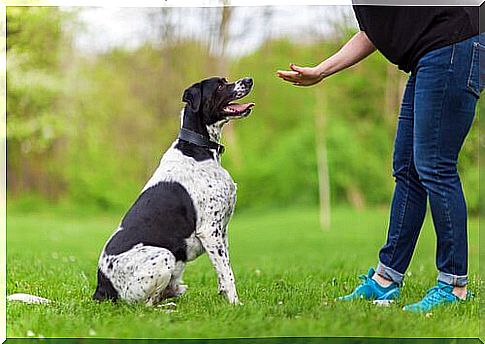Psychology Applied To Dog Training

Raising a pet is something serious, as the future behavior of the animal depends on it. The psychology applied to training dogs is very important, as identifying their thoughts and emotions can help us to educate them better.
What is psychology applied to dog training?
It’s not a new idea among celebrities or anything like that, but several studies have revealed the relationship between dog training and canine psychology.
There are even books in which we can learn about it, without having to be a trainer.
Fundamentally, it ‘s a matter of teaching certain primary obedience exercises based on the animal’s personality.
For some this can be tricky, especially when it comes to raising a puppy. But for others, who’ve had a pet for years, it might be what they’re looking for to get the dog to learn something new or change certain behaviors.
To talk about psychology applied to dog training , we have to talk a little about the so-called “positive education”.
It is characterized by eliminating punishments and choosing rewards when the animal does things correctly.
This type of dog training changed the teaching paradigm because trainers realized that an animal understands better when it is rewarded than when it is punished.
Because? Because it’s not good to relate a lesson to trauma or something “painful”.
Respect for the animal during training
Also, we must keep in mind that respect for animals is fundamental and this speaks to how we are as people.
This doesn’t mean that when you yell at the dog when he makes a mistake, we are bad, but we should do our best to avoid this kind of reaction.

Dog training a few years ago was simply not based on the premise of respecting them.
For this reason, the positive methods spread very quickly all over the world and today they are the only ones that thrive.
Many ‘new’ trainers use treats to reward good behavior. And some ‘old ones’ had to modernize in order not to be completely abandoned.
Of course, extremes are never good and balance is critical.
That’s why we talk about psychology applied to dog training, since each animal has a different profile.
Using just one method (either positive or negative) doesn’t always work. Avoiding punishment is what is expected, although in some cases it is necessary to use a slightly firmer voice for the animal to learn.
How is psychology applied to dog training?
Without becoming professional trainers, we can teach our pet what we want him to learn based on dog psychology.
One of the mistakes that can be made when trying to use the reward is to rely on it. In fact, the dog will not be learning, but will simply act to win the prize.

That way, if at some point we don’t have a cookie or something he likes, it would be his right not to comply with our requests.
And another very important issue: the animal will not know what it has to do because it will not think about how it should behave, but what it will receive in return.
Therefore, it is believed that it is necessary to combine positive techniques with some that are a little more “neutral”, so to speak.
That is, without resorting to beatings or violence, but with a firm voice and body language that tells the animal what it needs to hear.
There are several techniques to get a dog to respond to our call, to be quiet or to walk beside us when we go outside.
It depends on the animal’s personality and the owner’s commitment to knowing when to use each type of teaching. It’s just a matter of getting to know your pet a little and doing what’s best for him!








